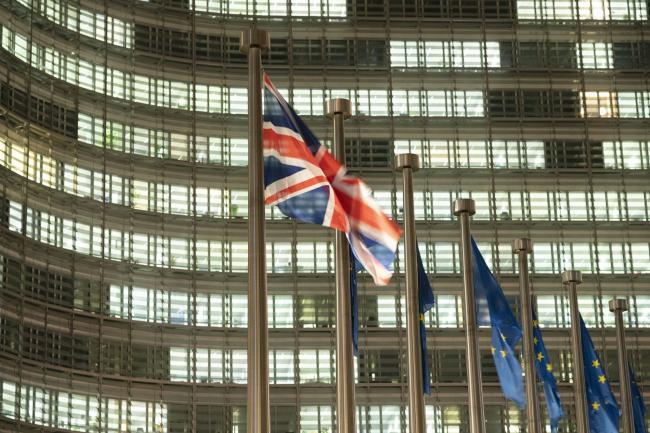(Bloomberg) -- British and European Union officials will start hashing out a future trade deal on Monday amid fears that talks could break down within weeks.
As negotiations on the future U.K.-EU partnership formally open in Brussels, three people familiar with the matter privately raised concerns that red lines on both sides could put the chance of an agreement in danger by early April.
The U.K. and EU are already at loggerheads on several key issues -- in particular state aid, where the bloc is insistent that Britain sticks to EU standards even after leaving its single market.
Boris Johnson has also prompted concern among European officials who worry he may backtrack on his commitments to avoiding a hard border on the island of Ireland, something that threatens to undermine trust between the two sides.
If negotiations fail, the U.K. will face crashing out of the bloc’s single market and customs union with no special trading terms in place at the end of this year. That will threaten major disruption to commerce and long term economic damage, as well as causing alarm for millions of people who live and work in Britain and the EU and travel regularly between the two.
About 100 British officials have descended on Brussels for talks aimed at codifying how the U.K. and EU will trade with each other and cooperate in areas such as internal security fishing rights after Brexit. The U.K. wants a tariff and quota-free trade deal, something that the EU says is on offer -- but both sides say achieving that can’t be at any cost.
Johnson, who has ruled out any extension to the negotiations beyond Dec. 31, has said he will walk away if no agreement is in sight by June. If that happens, the U.K. would default to trading on terms set by the World Trade Organization at the year-end, leaving businesses facing the return of tariffs and quotas.
Three people familiar with the negotiations said the crunch moment could even come before June, particularly if neither side is willing to pull back from their red lines in the first negotiating rounds.
Negotiating Rounds
The EU will host the first round in Brussels this week. A three-day session is scheduled for London from March 18, before negotiators return to the Belgian capital on April 6, days before Easter. By that point, people close to both sides say, it will probably be clear whether a deal is possible.
Brexit’s Next Act: the Agenda for the Coming U.K.-EU Trade Talks
The British team is led by Johnson’s Europe adviser, David Frost. In a speech last month, Frost said the government is approaching the talks “in a pretty confident fashion,” adding that “we are not prepared to compromise on some fundamentals of our negotiating position.”
Officials predict that will lead to heated discussions in the first few days.
The U.K. has refused to accept the EU’s concept of the “level playing field” to ensure fair competition. The bloc says a so-called “level playing field” would require London to ensure the country doesn’t undercut EU member countries in areas such as labor rights, taxation and environmental standards. On the power of the government to hand out subsidies to business, the EU wants its own rules to apply “to and in” the U.K. -- even if the bloc toughens them over time, something Britain says in unacceptable.
The negotiations don’t cover the matter of the border between Northern Ireland and the Irish Republic -- the most thorny issue that Brexit threw up. That’s because a solution was reached in the divorce deal between the U.K. and the EU which Johnson signed up to at the end of last year.
One U.K. official insisted the government is committed to implementing that deal. But suggestions in London that Johnson’s government will not conduct checks on goods traveling between Northern Ireland and the rest of the U.K. have raised concerns. The EU will monitor the situation closely, one European official said. The bloc has said it expects the U.K. to honor its commitments in full.

